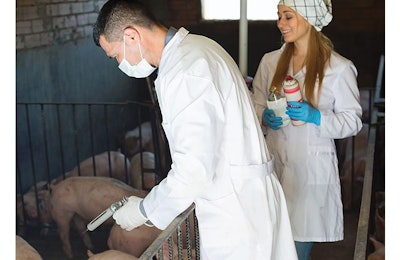
American pork industry leaders are skeptical that China does, in fact, have the country’s outbreak of African swine fever (ASF) under control.
Chinese agriculture minister Han Changfu asserted last week that in spite of new outbreaks of ASF, the country has stabilized swine production and has the disease “under effective control.” According to the World Organization for Animal Health (OIE), China has reported 127 outbreaks of ASF, but 103 have been resolved, with just 24 ongoing cases remaining.
But China’s official reports don’t match up with what producers and veterinarians on the ground in that country say is taking place, said Paul Sundberg, executive director of the Swine Health Information Center.
“I think it’s common information that China is underreporting both the number and extent of ASF outbreaks that they’ve had in the country, and that continues,” Sundberg said.
Although multiple parties have floated estimates about the impact of ASF in China, Sundberg doubted whether any of them were accurate. The outbreak, he said, is “very severe,” and almost certainly larger than what the Chinese government has reported.
Jim Monroe, senior communications director for the National Pork Producers Council (NPPC), was similarly skeptical of China’s claims regarding ASF.
“They’re dealing with an animal disease that is virtually endemic, in the world’s largest swine herd, and struggling to get a handle on it,” he said. “It’s hard to believe they’re getting it under control.”
Risks to US swine herd
As of last week, the OIE had reports of ASF in Cambodia, Vietnam and Mongolia, though the outbreaks in Mongolia are believed to be resolved. In the U.S., Monroe said the NPPC has urged Congress to approve funding to hire 600 additional agricultural inspectors for customs and border protection to prevent an outbreak in the U.S.
Monroe said he believed U.S. faces two primary risks with respect to the spread of ASF. Foreign visitors from Asia, he said, may accidentally bring the virus with them on their shoes or clothes — a threat that prompted the NPPC to cancel the World Pork Expo this month. The virus could also travel overseas on imported meat products, especially the infected meats that made their way to a garbage feeding facility or were otherwise somehow fed to pigs on American soil.
It’s not yet clear, Monroe said, whether the virus is transmitted via animal feed, but producers should be aware of where their feed is sourced and should take precautionary measures.
Sundberg agreed, but said goods imported from China are likely safe so long as they are produced in a biosecure facility. Producers should discuss biosecurity measures with their suppliers, he said.
View our continuing coverage of the African swine fever outbreak.

















